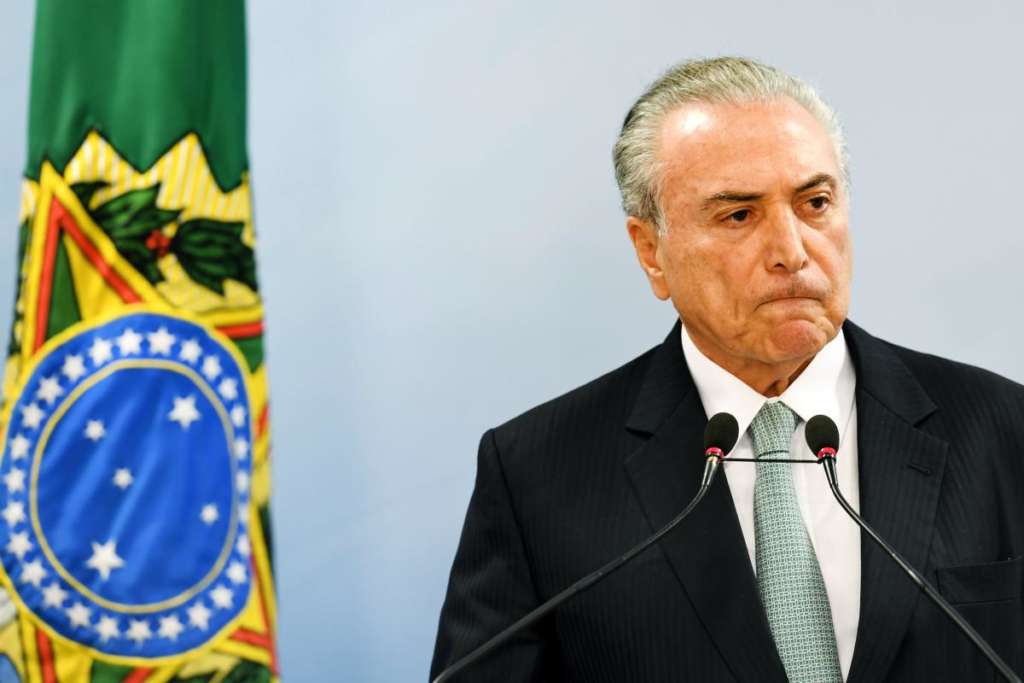Fresh after surviving attempts to impeach him, Brazilian President Michel Temer found himself in a new scandal after he was forced to deny claims that he had his administration spy on a Supreme Court justice investigating him for corruption.
In a story posted late Friday on its website, Veja magazine cites an anonymous presidential aide as saying that Temer and his advisers asked the Brazilian Intelligence Agency to spy on Edson Fachin, who is the justice in charge of an investigation into whether Temer accepted bribes and endorsed buying the silence of a former lawmaker convicted of corruption.
This is the latest in a series of accusations that threaten to cut short Temer’s tenure.
According to Veja, Temer’s team is looking for a way to discredit Fachin — and thus hopefully sink the investigation.
The revelations came just hours after the Supreme Electoral Tribunal cleared Temer’s 2014 campaign of charges that it received illegal financing. That decision was seen as giving the embattled Temer some breathing room, but the new accusations threaten to sink him anew, further constraining his ability to govern and reinvigorating calls for his resignation.
Carmen Lucia, the president of the Supreme Court, issued a scathing statement on Saturday, calling the alleged spying a tactic of dictatorships.
“It is unacceptable to commit a serious crime against the Supreme Federal Tribunal, against democracy and against liberty, if the report of this illegal invasion into the life of one of (the court’s) members is confirmed,” she wrote.
Attorney General Rodrigo Janot said he learned of the accusation with “puzzlement.”
“If such an attack on the powers of the republic and the democratic state of law is confirmed, it would be one more unhappy episode in the grave democratic crisis that this country is going through,” he said in a statement Saturday.
Temer denied the accusation in a statement.
“The government does not use the public machine against Brazilian citizens, much less does it engage in any kind of action that doesn’t respect the strict dictates of the law,” the statement said.
It also reiterated that the government has never tried to constrain Operation Car Wash, the sprawling corruption investigation that has ensnared much of Brazil’s political elite and led to allegations against the president himself.
Already exceptionally unpopular and seen by many Brazilians as illegitimate because he came to power following the impeachment and removal of his predecessor Dilma Rousseff, the accusations of corruption against Temer have called into question whether he can finish out his term.
Last month, a recording emerged that apparently captured Temer endorsing a plan to pay hush money to ex-House Speaker Eduardo Cunha, who is serving 15 years in prison for corruption and money laundering. Soon after, another bombshell emerged: Temer was being investigated for taking bribes.
Janot, the attorney general, is considering pressing charges against him for allegedly receiving bribes, over the audio recording and for allegedly trying to obstruct the Car Wash investigation.
Temer defied predictions of his imminent political demise when a court acquitted him on charges of having won election thanks to dirty money.
And after Friday’s vote in the Supreme Electoral Tribunal (TSE) he promptly went on the offensive in his battle to survive additional corruption accusations.
Despite being branded by opponents a political “zombie” and likened to characters from “The Walking Dead” television series, the scandal-plagued president’s acquittal in the TSE showed he still has plenty of political life.
The TSE judges voted 4-3 against stripping Temer of his mandate on the grounds that the 2014 presidential election was contaminated by undeclared campaign donations and bribes. That clears him to serve out the rest of his term to the end of 2018.
Dissenting judges painted a grim picture of the way Brazilian corporations seek to buy politicians in Latin America’s biggest country.
But with the panel drawn at 3-3, the TSE’s president Gilmar Mendes cast the deciding vote, urging cool heads at a time of national turmoil.
“You don’t switch the president of the republic every hour,” he said. “There are serious proven facts but not enough to annul the mandate.”
